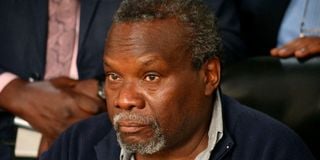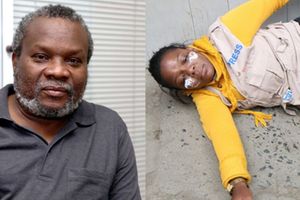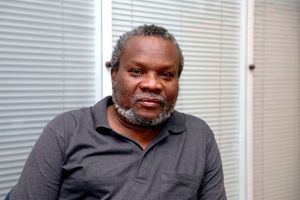
Veteran journalist Macharia Gaitho at the Independent Policing Oversight Authority offices after he was abducted on the morning of July 17, 2024.
"Why are you resisting arrest?" they demanded, slapping and punching me after forcing me into their car and driving me away from Karen Police Station.
I was by then properly subdued, handcuffed and sandwiched between two angry men as the Toyota Probox turned right at the Karen roundabout and sped down Lang'ata Road.
“I was not resisting arrest”, I shot back, "I was resisting abduction by criminals?”
More slaps followed.
“Can’t you see we are policemen?”
“No, as far as I can see you are thugs, maybe even terrorists. If you were genuine policemen you would introduce yourselves and show you Service identity cards. Show me your IDs,” I demanded.
Even in that terrifying situation—assaulted, held against my will and driven to an unknown destination after a braze abduction from a police station where I had rushed seeking protection—I couldn’t help but burst out into laughter at the response that followed:
“Didn’t you see that we are driving a Subaru and we have guns?”
It took a while before I composed myself, and retorted that as far as I knew, the Subaru make was not the exclusive preserve of the Kenya Police. And it was quite common for criminals too, to have guns. More slaps.
Then silence. From where I was in the middle of the back seat between two of my captors, I could see two firearms strewn carelessly on the floor between the driver and front seat passenger. I couldn’t figure out the make, not being an expert in those things, but I could tell they were powerful automatic rifles of the short and stocky types that seemed to be replacing the AK47 and the G3 rifle in the Kenya Police arsenal.
Remained mute
A lot of things were going through my mind as we drove down Lang'ata Road. They remained mute to my questions on who they were, why they’d seized me, and where they were taking me.
In the silence, I began to wonder when they might decide to use the guns on me, or torture me into confessing participation in some heinous crime in the style of the infamous Kenya Police ‘Special Branch’ of President Daniel arap Moi’s single-party dictatorship that President William Ruto’s government seemed keen to borrow from.
In the past few weeks since the GenZ revolt that had shaken the Ruto government, there had been widespread reports of a secretive special squad assembled by Director of Criminal Investigations Mohamed Amin that had been abducting suspected ringleaders or supporters in desperate attempts to find out who financiers and organisers of the protests were.
Those abducted in such a fashion against the basic laws and regulations on the carrying out of arrests were not booked into police stations as required. They were never produced in a court of law, but held in secret places for days on end, before being dumped in forests or other faraway places.
Many of those who survived the ordeals came out deeply traumatised, too terrified to recount what they had gone through. They would not even give information to lawyers instructed by human rights campaigners to file suit on their behalf.
It was worse. Some of those reportedly abducted had never resurfaced. One had been found dead in some remote quarry. My own kidnapping came just days after a gruesome discovery in a Nairobi garbage dump of over 10 bodies cut into pieces and stashed in gunny bags. They were most likely victims of a serial killer or a religious cult, but given the times there was widespread speculation that the bodies had been dumped by police death squads.
Brutal torture
I wondered what my pain threshold would be if subjected to brutal torture. I wondered which politicians, civil society activists or foreign development agencies I would be forced to bear false evidence against.
But I also considered myself lucky that at least they had not had a bag over my head. I was also comforted by the fact that I would not just be made to disappear into thin air, as I was abducted within the precincts of a police station, with at least a half dozen regular police officers witness, and my son present and recording the drama with my phone, and under instructions to immediately share the video with the rest of the family and my network of WhatsApp groups.
I had time to reflect on the strange series of events that had brought me to that terrifying situation.
It had begun as just another normal Wednesday. I normally work from home, but that morning I was heading to a hotel in the Kilimani area for a media training workshop organised by the Women in News programme of the World Association of Newspapers. I am a trainer on gender balance in the newsroom and news content.
My son was going to meet up with some friends later in the day and asked to ride with me. He got his driving license soon after he turned 18 last December, and any time we’re travelling together he takes the steering wheel as I enjoy the luxury of being chauffeured around.
We left home shortly after 8am with no inkling that it would be such an eventful day. There was nothing out of the ordinary as we turned into the usual morning traffic towards town on the busy Ngong Road.
Dark Subaru
My eyes were on the phone catching up with the news just past the turnoff to the Kenya Plant Health Inspectorate headquarters, when a dark Subaru cut in front of us, forcing my son to brake sharply. At the time that looked like the normal bad behaviour of Kenyan motorists who love speeding on the wrong side of the road in traffic jams, and then cutting back in sharply when they came against oncoming traffic.
The alarm bells therefore didn’t ring, but I found it odd when the Subaru stayed put once the traffic ahead started moving again.
Both of us loudly wondered whether the car partially blocking us had stalled, but within a short time it was a panic station when I saw from my wing mirror two men approaching menacingly from the left side, presumably having disembarked from another car following from behind.
Before I had time to react, my door was yanked open and my arms were grabbed as the two men tried to pull me out. As I struggled, one of the men pulled out a set of handcuffs and tried to fasten them on my left hand. That’s when it struck me that they were policemen, and I was about to become the latest victim of the infamous DCI abduction squads.
I was not going down without a fight. I struggled mightily, with the aim at least of slowing down the abduction attempt so that other motorists could realise something was amiss, and either try to intervene or pull out their cellphones and start recording the fracas. The idea was to have witnesses.
It was in the midst of it all that my son pulled a heroic stunt that I would never have expected. He accelerated sharply, turning hard to the left to squeeze past the Subaru blocking us. We started dragging the two men as they were still holding on to my arms and shoulders, but the safety belt held firm and thwarted their efforts. Eventually, they had to give up as we sped away, and I found myself having custody of a set of police handcuffs.
“Where do we go?” my son asked.
“Just go,” I responded. It had become a car chase as we drove on the narrow shoulder on the left side of the road to overtake the slow-moving Ngong Road traffic, having to dodge cyclists and pedestrians, as the white car, a Toyota Probox, that the assailants had come from followed in hot pursuit. On the other side, the Subaru was keeping up with us by speeding past the town-bound traffic on the wrong side, siren blaring and the occupants angrily pointing and ordering us to stop.
I told my son to keep on going. I knew they’d eventually catch up, but wanted to at least get to a place such as the Karen shopping centre where there would be lots of witnesses with cellphones at the ready, and CCTV cameras all over.
I also found time to give my son some quick instructions. One, I wouldn’t let them take me with my phone, always their first demand of any victim, so I’d leave it with him to hide. Secondly, I’d get out of the car and create as much of a ruckus as possible, while he’d lock himself inside, film the drama and speedily share the footage in my WhatsApp groups, particularly those related to media.
As we approached the Karen roundabout I noticed that the Subaru had cut ahead of the traffic, probably to intercept us further down before we reached the shopping centre. Immediately, I told my son to turn into the Karen Police Station just a few metres down the road.
We sped into the station attracting the attention of many uniformed officers in the yard. Immediately behind us the Probox screeched to a halt and three men got out. I also got out of my car and moved a few metres away as the abductors pointed at me menacingly.
They got hold of me and tried to force me into the Probox, but I resisted fiercely. The uniformed officers present seemed at a loss. Some meekly asked the plainclothes men what was going on, but were shut up with rude retorts that it was a DCI operation. They didn’t ask for further explanations or even ask that the men identify themselves. Some of them joined in the attempt to subdue me.
From the corner of my eye, I could see my son dutifully filming the drama despite the terror and anguish written on his face. One officer approached the car and angrily gesticulated, then tried to open the door, but my son had locked himself inside.
As we struggled, more officers from the Subaru that had also come joined in. The tall, beefy driver of the Subaru grew impatient, got out of his seat and came at me with boots flying. Eventually, I was overpowered and forced into the Probox, handcuffed and sat between two officers.
Then started the journey out of the police station, left to the Karen Roundabout and then the right turn down Lang'ata Road.
The first words they uttered were demands for my phone. I told them I never carry one. I was thoroughly frisked, and once they established I didn’t have it on me, They were upset at having been outwitted on that score. They demanded to know if my son had it, but I played dumb, insisting I didn’t own a phone.
The one in the front passenger seat, who seemed to be the commander of the operation, then placed a call to the Subaru partners who were still at the police station. Instructions were curt, and frightening: “Is his car still there? The boy has the phone. Get it from him. Na usimbembeleze”. The simple translation is ‘don’t plead with him’. The real meaning is ‘get rough with him’.
Occupational hazards
I anguished over what I’d gotten my son into. For me, run-ins with the police can be considered normal occupational hazards. An 18-year-old just a month out of ‘A’ level classes shouldn’t be drawn into such things. There was no way I could get a warning to him but only hope that he’d already shared the videos and therefore could safely surrender the phone before violence was meted on him.
Later, I came to learn that he’d remained holed up in the car when police knocked on his window demanding the phone. He insisted he didn’t have it, and refused to open the door. After a short while the man came back with the tale that the station commander wanted to see him in the office. He refused to take the bait. There was one demand he acceded to: Return of the handcuffs, which had not been properly fastened and had along the way fallen on the floor. He rolled down the window just an inch, just enough to pass the cuffs through.
Along Lang'ata Road, I was driven for just about 10 minutes in the heavy morning. The apparent team leader was continuously on the phone, telling his colleagues he was talking to a MrMwaura at DCI headquarters, who sources now reveal is the commander of the secretive abduction unit charged with uncovering the financiers and organisers of the GenZ youth protests against the government's taxation proposals.
Much of the phone conversation was in police lingo and I gathered it was about where I was to be taken.
Somewhere towards the Lang'ata South Road turning, the car stopped. My handcuffs had been fastened a bit too tight, and the officer to my right sensed my discomfort and offered to loosen them. I did not thank him once he was done.
After another long phone conversation, the team leader ordered the driver to make a U-turn. I still had no inkling what was afoot, but was curious when we stopped at the Shell petrol station opposite the same police station I’d been abducted from. The team leader got out of the phone and continued his phone conversation out of earshot.
After a while, he came back and asked for my national identity card, which I handed over, and he walked back some 10 metres or so still on his phone. One of the other officers asked what my cellphone was, but I refused to answer, telling him I’d only talk once booked into the police station, and only in the presence of my lawyer.
Finally, the team leader walked back to the car. He had a sheepish, embarrassed look on his face. The tough, mean visage had dissipated. He ordered his colleague to uncuff me. I was free, he said, they’d been after another person with a similar name.
I asked them to let me out of the car, but they said they’d drive me back to where they’d picked me. The police station.
At the station, some family and relatives already gathered. My son had raised the alarm. I was kept in the car for a while before the doors were opened and I walked out into free air. I was told I could now head back home, but I responded with a form No. I had a crime of abduction to report, and I would only do it at the station which was also the scene of crime.
At the report desk, officers were scrambling to distance themselves from what happened. Many expressed sympathy, explaining that it was a mission run by DCI headquarters, which had ignored the normal courtesy of informing the local police station of any operation within its jurisdiction.
They did not explain how they allowed armed men who did not identify themselves to barge into the police station, intimidate them and force a person seeking their protection into a car and drive away. I told them that even criminals or terrorists could storm the station and also claim to be DCI agents.
The officers were extremely reluctant to record my complaint, coming up with the bizarre suggestion that I report to DCI headquarters, which I flatly refused. That would amount to delivering myself into the hands of the very same abductors.
I also rejected another suggestion that I report at the divisional police station in Langata. After a lot of toing and froing and a furious series of phone calls to superiors, an officer was finally told to record my complaint in the Occurrence Book.
In the meantime, the Director of Criminal Investigations released a statement explaining that it was all a case of mistaken identity; they were looking for a controversial blogger who happened to have the same name as me!
That seemed like a blatant lie, but if true spoke eons on the ineptitude of Mr Amin’s criminal intelligence network.
Identify themselves
It also served to confirm that it is indeed Amin’s office that has been behind the series of abductions. His statement also did not explain why arrests had to be carried out brutally outside all known police protocols which require officers to identify themselves, treat ‘customers’ with courtesy and civility, and properly book them into authorised police stations.
Secretive special squads under the tenure of Amin’s predecessor, George Kinoti, which served then President Uhuru Kenyatta’s political missions, were disbanded as soon as President Ruto took office. With that came the pledge to end the culture of extra-judicial executions, holding suspects in secret cells, use of torture and general use of police for political persecution.
The existence of new special squads at DCI, which reportedly also include officers drawn from the National Intelligence Service and the military, indicates that the very same methods have been revived.
At Karen police station, a stellar support cast was assembled made up of my children, siblings, friends, and leaders of the media fraternity. From there, we proceeded on legal advice, to record another complaint at the headquarters of the Independent Policing Oversight Authority, the body mandated to investigate misdeeds by the police service.
It remains to be seen whether this case will make any headway, or if it will stall like many other investigations stymied by a police service that officially asks officers to defy the civilian oversight agency.
Meanwhile, Subaru used to be the car associated with flashy young men given to displays of motoring machismo. It is now solidly associated with police squads in mufti that operate on the margins of the law.








